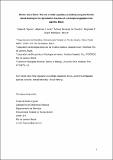Files in this item
Dinner and a show : the role of male copulatory courtship song and female blood-feeding in the reproductive success of Lutzomyia longipalpis from Lapinha, Brazil
Item metadata
| dc.contributor.author | Vigoder, Felipe M. | |
| dc.contributor.author | Araki, Alejandra S. | |
| dc.contributor.author | de Carvalho, Antonio Bernardo | |
| dc.contributor.author | Brazil, Reginaldo P. | |
| dc.contributor.author | Ritchie, Michael G. | |
| dc.date.accessioned | 2021-08-04T23:39:42Z | |
| dc.date.available | 2021-08-04T23:39:42Z | |
| dc.date.issued | 2020-11 | |
| dc.identifier | 269236066 | |
| dc.identifier | 2ac72dbc-1a09-4f31-9282-5aa9eed9c681 | |
| dc.identifier | 85089336689 | |
| dc.identifier | 000593913000020 | |
| dc.identifier.citation | Vigoder , F M , Araki , A S , de Carvalho , A B , Brazil , R P & Ritchie , M G 2020 , ' Dinner and a show : the role of male copulatory courtship song and female blood-feeding in the reproductive success of Lutzomyia longipalpis from Lapinha, Brazil ' , Infection Genetics and Evolution , vol. 85 , 104470 . https://doi.org/10.1016/j.meegid.2020.104470 | en |
| dc.identifier.issn | 1567-1348 | |
| dc.identifier.other | ORCID: /0000-0001-7913-8675/work/78527844 | |
| dc.identifier.uri | https://hdl.handle.net/10023/23720 | |
| dc.description | The work was supported by CNPq (Science without Borders program) and CAPES. | en |
| dc.description.abstract | Lutzomyia longipalpis is the main vector of visceral Leishmaniasis in the Americas and is composed of a species complex. Males of this sand-fly produce acoustic signals during copulation and different patterns are observed among Brazilian populations. Such acoustic signals are commonly involved in species recognition. However, since the song is only produced during copulation it is not clear how it affects mating success or contributes to sexual isolation. Another aspect that may affect reproductive success is the presence of food. Since hematophagy is such an important aspect of L. longipalpis biology, we wanted to test if blood-feeding can influence the reproductive behaviour of this insect. We performed crossing experiments removing males' wings (silencing them) and playing back either the homo-specific or the hetero-specific song to either unfed or blood-fed females. Our results showed that both songs and blood-feeding affect insemination success, but not the frequency of copulation. In trials where females were not blood-fed song clearly affected insemination; males with wings, and males with homo-specific song playback had a higher insemination success than wingless males (no song) and trials with hetero-specific song. Blood-feeding females prior to the trials increased insemination in all groups including the control group which suggests that mating happens simultaneously with, or immediately after, the blood meal. Blood-fed females also seemed to discriminate less against the wrong song or the lack of song (wingless) one day after feeding, however trials with the correct song still had higher insemination rates. Altogether, our results show that both the male copulatory courtship songs and female blood-feeding are important for reproductive success and as such are important components of the sexual behaviour of L. longipalpis. | |
| dc.format.extent | 8 | |
| dc.format.extent | 236445 | |
| dc.language.iso | eng | |
| dc.relation.ispartof | Infection Genetics and Evolution | en |
| dc.subject | Sand flies | en |
| dc.subject | Copulatory courtship | en |
| dc.subject | Copulation song | en |
| dc.subject | Lutzomyia longipalpis | en |
| dc.subject | Species complex | en |
| dc.subject | Sexual behaviour | en |
| dc.subject | Blood-feeding | en |
| dc.subject | QH301 Biology | en |
| dc.subject | DAS | en |
| dc.subject.lcc | QH301 | en |
| dc.title | Dinner and a show : the role of male copulatory courtship song and female blood-feeding in the reproductive success of Lutzomyia longipalpis from Lapinha, Brazil | en |
| dc.type | Journal article | en |
| dc.contributor.institution | University of St Andrews. Centre for Biological Diversity | en |
| dc.contributor.institution | University of St Andrews. Institute of Behavioural and Neural Sciences | en |
| dc.contributor.institution | University of St Andrews. School of Biology | en |
| dc.identifier.doi | https://doi.org/10.1016/j.meegid.2020.104470 | |
| dc.description.status | Peer reviewed | en |
| dc.date.embargoedUntil | 2021-08-05 |
This item appears in the following Collection(s)
Items in the St Andrews Research Repository are protected by copyright, with all rights reserved, unless otherwise indicated.

